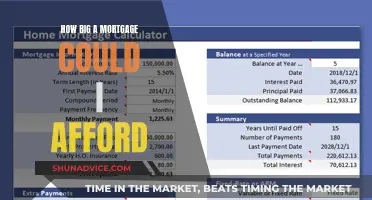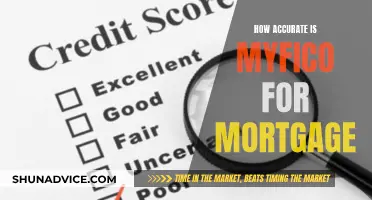
When applying for a mortgage, an official valuation of the property is required by the lender to assess whether the house is worth the agreed-upon price. This is done by a qualified surveyor or an Automated Valuation Model (AVM) and helps the lender determine the loan-to-value (LTV) ratio, which impacts the interest rates offered to the borrower. The LTV ratio is calculated by comparing the loan size to the overall property value. While a physical inspection of the property is not always necessary, it is recommended that a home survey is conducted to identify any potential issues.
| Characteristics | Values |
|---|---|
| Purpose | To reduce the risk of a difference in the price paid and the actual value. |
| To protect the buyer from overpaying for a property. | |
| To ensure the property is a good investment and provides enough security for the loan. | |
| To help calculate the loan-to-value (LTV) ratio. | |
| Who commissions it? | The lender. |
| Who carries it out? | A qualified surveyor or an Automated Valuation Model (AVM). |
| Types | In-person visits, drive-by, and automated valuations. |
| Desktop valuations. | |
| What does it assess? | Property size, condition, location, and comparable market prices. |
| Whether there are any property defects. | |
| Whether the property is built from standard materials. | |
| Whether the cladding is considered a fire risk. | |
| Outcome | If the property is valued lower than the agreed price, it may lead to a revised mortgage offer. |
| If the property is valued higher than the purchase price, it may be because the purchase price is lower than the market value. | |
| Report | The buyer may not receive a copy of the valuation report. |
| The report can flag issues that may affect the security of the loan. | |
| Cost | Some mortgage valuations are free, others can cost up to £1,500. |
What You'll Learn
- Mortgage valuations are done by qualified surveyors or using an Automated Valuation Model (AVM)
- Lenders use mortgage valuations to determine the loan-to-value (LTV) ratio
- A mortgage valuation is different from a property valuation or appraisal
- A physical inspection of the property is not always required
- The valuation report can flag issues with the property

Mortgage valuations are done by qualified surveyors or using an Automated Valuation Model (AVM)
When applying for a mortgage, a mortgage valuation is required by the lender to assess whether the house is worth the price you are planning to pay for it. This is done to help calculate the loan-to-value (LTV) ratio, which determines the mortgage rates you are eligible for. The LTV ratio is the amount you want to borrow in relation to the value of your home.
Mortgage valuations are typically carried out by qualified surveyors or calculated using an Automated Valuation Model (AVM). AVMs are statistical valuation methods that use mathematical modelling techniques and software to value properties. They are based on a combination of two or more types of evaluation, most commonly a hedonic model and a repeat transaction index. AVMs use property data, along with information on local real estate and your neighbourhood, to determine the value of your home. They can be useful for assessing the value of a property portfolio and are often used by lenders to estimate the value of a property quickly and cheaply.
However, AVMs have limitations. They rely on the quality and quantity of the data they are given and do not factor in the actual condition of the property. Human appraisers are considered more accurate than AVMs, and a conventional lender will require a full appraisal for a home purchase. Mortgage valuations by surveyors may not always require a physical inspection of the property, but they can help flag any issues with the property that could affect its value.
Mortgage Pools: How Are They Sold?
You may want to see also

Lenders use mortgage valuations to determine the loan-to-value (LTV) ratio
Lenders will often commission a mortgage valuation, also known as a valuation survey, to assess whether the property is worth the agreed-upon price. This valuation is typically carried out by qualified surveyors or calculated using an Automated Valuation Model (AVM). The AVM uses publicly available information, such as Land Registry data, property portal archives, satellite and street-view imagery, and recent sales prices of similar local properties.
In some cases, a drive-by valuation may be conducted, where a surveyor assesses the property from the outside, looking for major problems that could affect its value. The lender may also request additional documents, such as a New Home Warranty, if the property is under a certain age or has been extensively renovated.
The LTV ratio plays a significant role in determining the interest rate a borrower can secure. A higher LTV ratio may lead to a higher interest rate and could require the borrower to purchase private mortgage insurance (PMI) to offset the risk to the lender. Government-backed loans, such as FHA and VA loans, typically allow for higher LTV ratios compared to conventional mortgages.
The LTV ratio also impacts other aspects of the loan, such as the minimum down payment amount. A lower LTV ratio means a borrower may be able to make a smaller down payment, while a higher LTV ratio may require a larger down payment to avoid paying PMI.
Understanding Mortgage-Backed Securities: Pricing and Risks
You may want to see also

A mortgage valuation is different from a property valuation or appraisal
A mortgage valuation is an essential part of the mortgage application process. It is carried out by a qualified surveyor or calculated using an Automated Valuation Model (AVM) and is addressed to the lender, assessing whether the property is suitable security for the loan.
A mortgage valuation is for lending purposes only, whereas a property valuation or appraisal is for the benefit of the property owner or buyer. The mortgage valuation is a limited inspection of the property, and the report is not shared with the buyer. It may uncover obvious, visible defects, but it is not a structural property survey.
A property valuation or appraisal, on the other hand, is a more comprehensive assessment of the property's value and condition. It can be carried out by a qualified surveyor or estate agent and will include a full inspection of the property. This type of valuation can be useful for buyers to identify any potential issues with the property before committing to the purchase.
It is important to note that a mortgage valuation is not a guarantee of mortgage approval, and a down valuation can occur if the property is valued lower than the agreed price. In such cases, the lender may reduce the loan amount or offer a different interest rate.
The Creation Process of Mortgage-Backed Securities Explained
You may want to see also

A physical inspection of the property is not always required
Mortgage valuations are often completed by qualified surveyors or calculated using an Automated Valuation Model (AVM). The AVM uses online data such as recent sales prices, Land Registry details, local knowledge, and experience to estimate the property's value. This means that no one will visit the property, and the valuation can be done without a physical inspection.
A desktop valuation can be used to assess the value of a home using publicly available information. This includes data from the Land Registry, property portal archives, satellite and street-view imagery, and sold prices of similar local properties. A 'drive-by valuation' is another form of desktop valuation, where a surveyor assesses the property from the outside, looking for major problems that could affect its value.
A physical inspection may be necessary if there is a risk of significant monetary losses due to an inaccurate valuation. This type of inspection is more likely to result in an accurate property valuation, as it allows for a more detailed assessment of the property's condition and any issues that may impact its value. However, it is important to note that a physical inspection is not always required, and the decision to conduct one depends on the purpose of the valuation and the level of risk involved.
Mortgage Broker Payment Methods in Australia: What You Need to Know
You may want to see also

The valuation report can flag issues with the property
A mortgage valuation is done to help the lender decide if the property is suitable security for the loan. It is important to note that a mortgage valuation is different from a property valuation or appraisal, which advises the owner on the potential market price and how much they should list it for. Mortgage valuations are for lending purposes only and are carried out by qualified surveyors or calculated using an Automated Valuation Model (AVM).
A mortgage valuation may also flag issues with applicant eligibility, such as affordability checks or changes to personal circumstances since the initial application. This could result in a 'down valuation', where the lender is only prepared to lend a percentage of the purchase price or mortgage valuation (loan-to-value), whichever is lower.
In some cases, a lender may request additional documents, such as a New Home Warranty, if the property is under 10 years old or has been extensively renovated or converted. This protects the lender and the homeowner in case structural defects are found in the building.
It is important to note that a mortgage valuation is not the same as a house survey, which assesses the condition of a property in more detail. A house survey is recommended to flag any potential issues with the property that may require costly repairs.
Mortgage Bankers: Salary Insights and Payment Structures
You may want to see also
Frequently asked questions
A mortgage valuation is an assessment conducted by a lender to determine the value of a property before approving a mortgage loan. It is done to ensure that the property is worth the price being paid and is suitable security for the loan.
You'll need a mortgage valuation when applying for a mortgage. Your lender will insist on a mortgage valuation being carried out to check whether the house is worth what you’ve agreed to pay for it and to work out the loan-to-value (LTV) ratio.
A mortgage valuation includes a limited inspection of the property for lending purposes only. It considers factors like property size, condition, location, and comparable market prices. It does not include the assessment level involved in a homebuyer's report or a full structural survey.
Mortgage valuation costs are typically determined by the sale price of the property. The higher the property price, the more you may need to pay for the valuation unless it’s offered for free. Mortgage valuations can cost anything between £400 and £1,500 depending on the property’s price.
The valuation report is usually returned within 5 business days after the inspection. If the valuation meets the lender's requirements, a mortgage offer is issued within 48 hours. The entire process can take around one week but can vary based on individual circumstances.







